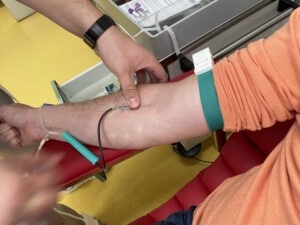Personal growth is a lifelong journey. People who intentionally set out to enrich their lives through self-growth and development report that they are happier, more successful, and have better relationships. In this article, we explain why personal growth is important to your career and list some tips to help you get started on a path of personal development.

Why is personal growth important?
Whether it be intellectually, morally, physically or all of the above, personal growth is the direct result of efforts made to improve yourself. Sometimes referred to as self-improvement or self-actualization, the purpose of personal growth is to improve one’s habits, behavior, actions, and reactions. Some examples of personal development include:
- Learning to control your anger
- Learning to overcome the urge to procrastinate
- Taking time to be there for your body through exercise and a healthy diet.
- Learning to break the habit of laziness
- Learning to be more considerate
- Learning to become more responsible
- Developing new skills and learning new things
- Changing your mindset
- Adopting a more positive attitude
Strategies for personal growth
While everyone’s personal growth path varies, here are some habits you can adopt to get your transformation started:
1. Keep learning
The ability and desire to learn are powerful skills that can have a positive impact on many areas of your life, including professionally. Learning can take place in a traditional sense through reading or studying, or in a more interpersonal sense through listening. Either way, it’s a crucial aspect of personal development.
Education has always had economic ramifications. For many, learning can feel like a luxury. However, there are more resources than ever for individuals looking to expand their knowledge. Whether you take advantage of free programs online or resources like the library, there are plenty of opportunities to learn.
Another important aspect of learning is listening. Listening is a powerful learning tool that will help you develop your interpersonal skills and relationships. It is through listening to the experiences and opinions of others that you can expand your perception of the world and your placement in it.
2. Volunteer your time
Volunteer opportunities are a wonderful way to do some good, learn some new skills, and gain valuable perspective. While volunteering, there are skills that a volunteer coordinator would love to teach you, but that you might otherwise never learn. Helping others can also aid in your personal development by growing your ability to empathize, as well as by expanding your worldview.
3. Experience new things and places
As with volunteering and learning, traveling is a vital part of gaining perspective. It can be easy to forget that there are people and places that are radically different from what you’re used to. Traveling can challenge your thought processes, senses, and personal growth.
Though international travel offers the most stimulation, you don’t have to go to a different country to see something new. Oftentimes, even a different city or state could be the catalyst that inspires your creativity and happiness.
4. Get creative
Creativity promotes self-awareness, which is an important aspect of personal growth and development. It’s unnecessary to be a particularly skilled creative in order to experience the benefits of creativity. Whether you decide to dance, draw, write, photograph, play music, act, or choose any other creative pursuit, you will find that the act of creating is cathartic and, ultimately, it’s way more important than the end result.
5. Make your health a priority
Personal growth requires commitment and self-discipline. It means prioritizing what is good for you, rather than what’s easy. Treating your body with care and respect is an important part of your individual development.
Personal growth is an active endeavor and it requires strength and endurance, which is why getting in shape is so beneficial for personal development. Making your health a priority looks like eating a balanced, healthy diet and exercising. It’s getting enough sleep, and taking your vitamins. A healthy lifestyle will lead to many benefits, one of which is that your self-perspective will absolutely change for the better.
6. Evaluate your life
Self-awareness is a key aspect of personal growth, so it’s important that you take some time to do a full evaluation of your life. Here are some important questions to ask yourself that will help guide you through effectively evaluating your life:
- What is your life like now? What areas are you happy with? What areas do you feel need to improve?
- What would you like your life to be like? How do you hope to improve yourself, and why is it important that you do so?
- How do you accomplish these changes, and what do you need to do so? What knowledge and experiences will aid in your personal development? Spend time looking for resources to help you along your journey.
- What is your timeline? Make a list of activities and things you’d like to experience, and create milestones, to keep track of your progress.
Once you’ve confronted your shortcomings, make plans to improve them. Being aware is only part of the struggle. Creating change and self-growth requires action, so start by taking small steps to improve your situation in life.
7. Manage your time
Wasting time is all too easy, and most of us do it for hours every single day without realizing it. It can feel like you don’t have time, but that’s likely just an illusion. You have time, you’ll just need to modify how you spend it. Prioritizing your personal growth will radically change how you spend your free time.
Here are some common time-wasting activities, and how you can restructure them to benefit your personal development:
- Watch less television and when you do watch, truly focus on watching shows and films that you love instead of binging something you’re really uninterested in.
- Reduce the amount of time that you spend aimlessly surfing the internet. Consider setting a timer to make you aware of how much time has passed.
- Rethink your commute and consider taking the bus instead of driving. You could then use the time to read, meditate or listen to podcasts and learn new information or skills.
- Recruit some of your friends to turn a mindless hangout into something more constructive and/or productive, like volunteering, spending time in nature by hiking or kayaking, playing a sport, or taking a class together.





































